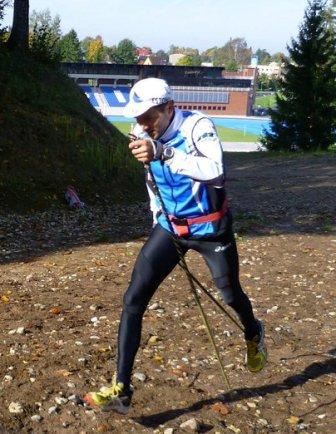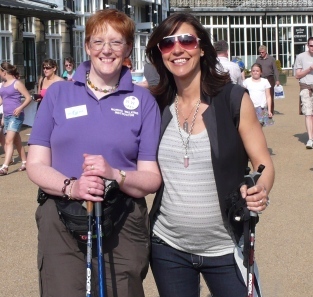
Nordic walking: have poles, will travel a bit quicker
Poles apart: Nordic walking for beginners
Physical activity has never been higher on the public agenda and, with
The Leisure Review launching a series of articles on this aspect of the sport, leisure and culture sector, Mick Owen tried out a new approach to an age-old experience.

Nordic walking: have poles, will travel a bit quicker
The July edition of TLR explored the views of health practitioner and physical activity advocate William Bird, a Berkshire GP who is urging sport and leisure professionals to be more cunning about how they package their product. His big idea is to smuggle physical activity into his colleagues’ prescribing toolkit and deliver the benefits of exercise under another guise. Nordic walking would appeal to Dr Bird.
Asked to describe Nordic walking, Catherine Hughes, the director of British Nordic Walking, goes straight to the benefits: "It is a great activity for those just starting out with exercise, as the poles take some of the strain, relieving pressure on joints. But despite feeling easier, the activity can burn up to 46% more calories than normal walking." To the uninitiated the activity looks like cross-country skiing without snow and indeed that is where it came from but to the enthusiast it seems to be all things to all people with British Nordic Walking having trained "a wide range of instructors from PCT physical activity officers who run classes for GP referral schemes to ex-forces personnel running fitness classes for the super fit."
With ten million regular Nordic walkers in the world, the label “one of the fastest growing exercise activities in the UK” and a pair of poles gathering dust in the shed, the offer to give it a trial run, or rather walk, was almost welcome. The ‘almost’ has to be appended to take into account rugby-ravaged knees and a volleyball-weakened lower back, plus a learned dislike of circuit training, interval training, fitness suites and people in Lycra who shout. The fitness sector and this correspondent are as chalk and cheese, and the invitation to share a walk in the woods – with poles, companions and a trained instructor – hovered dangerously between the two.
Elizabeth Charnley is, among other things, an instructor with British Nordic Walking and, like her director, she is persistent, patient and charming. We meet in a car park of the Mersey Valley Visitor Centre where the plan was for a little light introductory coaching followed by a quiet walk around the reclaimed gravel pits that now form Sale and Chorlton Water Parks, and then along the River Mersey itself. The only jarring note came from men and women in bibs running up and down every available path being shouted at by people pretending to be drill sergeants just back from Helmand, which meant peace and quiet was in short supply.
The premise of Nordic walking is that you combine basic walking with core and upper-body exercise using the resistance of the ground behind you. The action of the poles also serves to make walking more efficient and so you work harder while feeling you are working less. To quote British Nordic Walking’s website, “The result is a full-body workout, which means that you burn up to 46% more calories compared to walking without poles, release tension in the neck and shoulders, improve your posture and gait, strengthen your back and abdominal muscles and reduce the impact on the joints.”
Having nailed the basics, and been encouraged by Charnley’s support, the prospect of a nice walk in the admittedly pallid sunshine seemed like a good idea; and, having met the lovely people who had signed up for a council -funded walk, we set off. By the time we had rendezvoused with our final companion the poles were no longer dragging, the nagging tension in the shoulders had eased and the sounds of British Military Fitness had faded; all was right with the world.
Some two hours and 10 kilometres later much had been learned, from the minutiae of gait analysis to more general information about the spread of Nordic walking, which is being used by the Finnish army to train its far-from-fit recruits and is now included as a category in the Robin Hood marathon in Nottingham, where walkers start at the back and delight in breezing past ‘runners’, usually on the hills.
At its extremes Nordic walking is a competitive activity and has also transmuted into Nordic running but our group, numbering pensioners, people rehabilitating from knee surgery and those motivated as much by the sociability of the activity as the potential for exercise, were happy enough to maintain a steady pace which, although never causing breathlessness, still put a healthy glow just short of perspiration on everyone’s faces. Such was the effort expended that a decent warm down was required and for at least one participant an afternoon watching the Challenge Cup Final from a reclining position.
The health claims for Nordic walking are strong. It is a sociable way to take exercise which can be, but need not be, extremely strenuous. It is easy to learn and it is easy to find places to do it. The kit is cheap if you need it to be. It works for eight-year-olds and eighty-year-olds. Will it take over the world? It probably already has; we just don’t know it yet.
Mick Owen is the managing editor of The Leisure Review, now showing the effects of a life dedicated to sporting achievement.
You can learn more about Nordic Walking and contact Catherine Hughes at www.britishnordicwalking.org.uk
Elizabeth Charnley can be contacted through her www.g1wob.net
The Robin Hood marathon is on 11th September in Nottingham although the man himself was actually from Yorkshire, apparently.
The Leisure Review, September 2011
© Copyright of all material on this site is retained by The Leisure Review or the individual contributors where stated. Contact The Leisure Review for details.
Download a pdf version of this article for printing
